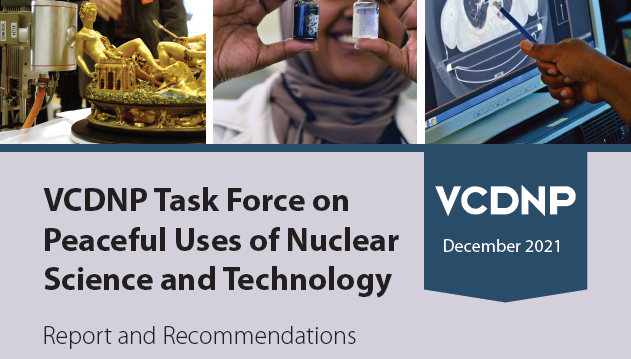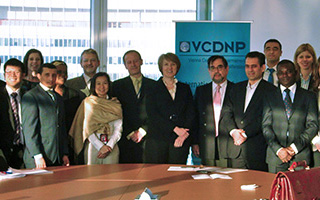
The first Joint Meeting of the Institute for Nuclear Materials Management (INMM) and the European Safeguards Research and Development Association (ESARDA) took place from 23 August to 1 September 2021. The Joint Meeting included presentations from several VCDNP staff members, including VCDNP Executive Director Elena K. Sokova, as well as VCDNP Research Associates Artem Lazarev and Noah Mayhew.
Ms. Sokova organised and moderated a panel discussion on the Treaty on the Prohibition of Nuclear Weapons (TPNW), which entered into force on 22 January 2021. Since its entry into force, questions have been raised with regard to its standing in international nuclear governance, including its relationship with other major international treaties, how the nuclear-weapon States under the Treaty on the Non-Proliferation of Nuclear Weapons (NPT) might engage with the TPNW, and how the relationship between European countries, particularly members of NATO, and the TPNW might evolve in the coming years. These and other questions were the focus of the discussion. The speakers at the panel included Ambassador Alexander Kmentt (Director of the Disarmament, Arms Control and Non-Proliferation Department at the Austrian Ministry for European and International Affairs), Mr. Daryl Kimball (Executive Director, Arms Control Association) and Dr. Tytti Erästö (Senior Researcher, Stockholm International Peace Research Institute).

In his presentation, Mr. Lazarev discussed the removal of disused radioactive sources and material from the Republic of Moldova’s breakaway region of Transnistria. His presentation was based upon results of a study co-authored with Margarita Kalinina-Pohl, Miles Pomper, and George M. Moore from the James Martin Center for Nonproliferation Studies. Mr. Lazarev provided an analysis of political, technical, and other factors that contributed to the success of the removal of radioactive sources and material. He also shared a number of lessons that might be applicable for tackling radiological security challenges in a territory not controlled by the central government.
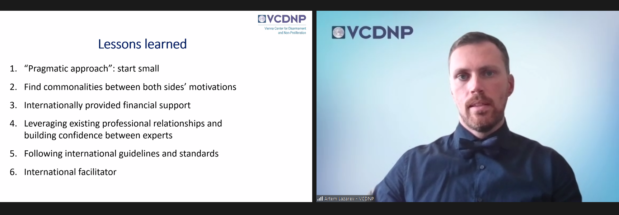
They included, among other things:
Mr. Mayhew gave three presentations during the Joint Meeting. The first presentation was the product of his participation in INMM’s Arms Control, Treaty Verification, and Disarmament (ACTVD) Mentorship Programme. Through the programme, Mr. Mayhew and Jacob Benz (Nuclear Engineer, Pacific Northwest National Laboratory) jointly wrote an entry to the ACTVD Primer, a new INMM publication that serves as an introductory resource and refresher for technical and non-technical experts in arms control and non-proliferation, current treaties and their implementation, as well as verification technologies. Mr. Mayhew and Mr. Benz wrote on the Plutonium Management and Disposition Agreement, and Mr. Mayhew presented the entry to a session in the Annual Meeting.
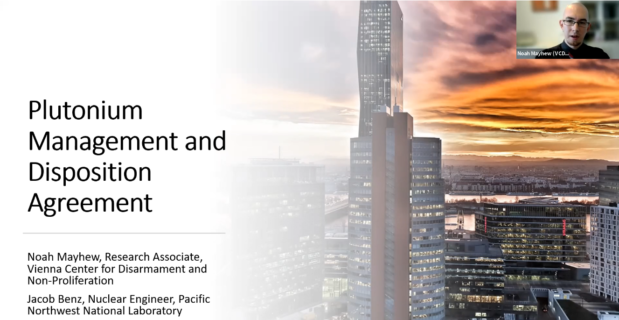
His second presentation pertained to the role of non-governmental organisations (NGOs) in nuclear materials management. In 2021, the VCDNP celebrates 10 years of operation. Mr. Mayhew gave an overview of the VCDNP’s core activities, including training diplomats and practitioners in nuclear non-proliferation topics, convening results-oriented dialogue and conducting impact-driven research. During the discussion portion of the session, participants and panellists discussed ways in which the VCDNP, together with the other organisations represented, including ESARDA, INMM, Open Nuclear Network and the Verification Research, Training and Information Centre (VERTIC), could work more collaboratively in the future.
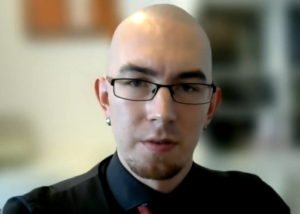
Finally, during the session on “Today's Verification Challenges: Lessons from the Past,” Mr. Mayhew presented on lessons learned from the US-Russia-IAEA Trilateral Initiative and their applications for today. The Trilateral Initiative was born as a feasibility study in 1996 to determine how excess, weapons-usable nuclear material could be removed from US and Russian defence programmes and placed under permanent monitoring by the IAEA without revealing proliferation-sensitive information. While the Trilateral Initiative ended in 2002, Mayhew argued that the lessons learned could inform future endeavours, including in arms control and fissile material reductions. He pointed to the following lessons:
